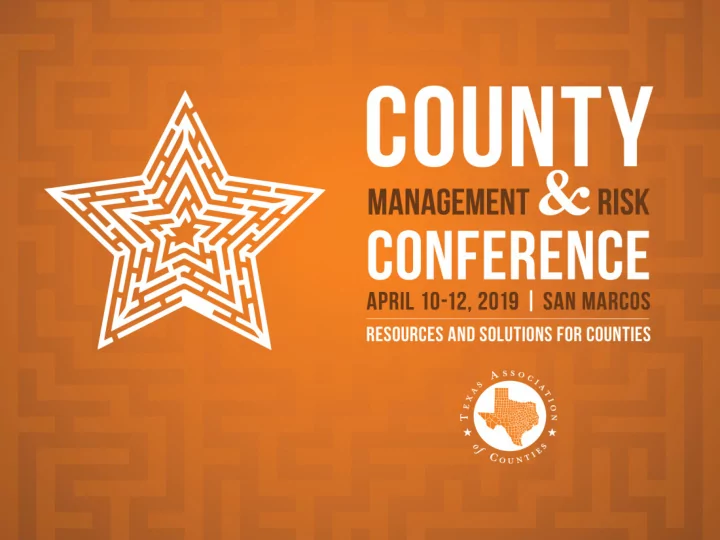

Anatomy of an Employment Lawsuit From Conception to Natural Death Mike Thompson, Texas Association of Counties, Associate General Counsel Joanna Lippman Salinas, Fletcher, Farley, Shipman & Salinas, LLP
Background & Overview • Prerequisites – before a lawsuit can be filed • Conception of a Suit • Discovery Phase • Trial • Final Judgment – death of a lawsuit
PREREQUISITES EEOC – Charge of Discrimination TWC – Charge of Discrimination *Some claims are not subject to pre-suit charges
PREREQUISITES • Charge of Discrimination • Responding to pre-suit charge of discrimination • Possible pre-suit mediation by TWC or EEOC • Position Statement • Right to Sue letter from agency
THE LITIGATION PROCESS
OPENINGS
OPENINGS IN A LAWSUIT YOU HAVE BEEN SUED
Service of Process Must receive official notice of suit recognized by law. Service of Process starts the clock on when a written response must be filed by the Defendant.
THE PETITION
THE ANSWER
THE DISCOVERY PROCESS What is the Purpose of Discovery? • The purpose of discovery is to allow parties to obtain full knowledge of • the issues and facts of the lawsuit before trail. West v. Solito, 563 S.W.2d 240,243 (Tex.1978) What Knowledge May We Discover? • In general, a party may obtain discovery regarding any matter that is not • privileged and is relevant to the subject matter of the pending action, whether it relates to the claim or defense of the party seeking discovery or the claim or defense of any other party. Tex. Rule of Civil Procedure 192.3. What is Relevant? • Relevant evidence is defined as: “…having any tendency to make the • existence of any fact that is of consequence to the determination of the action more probably or less probable than it would be without the evidence. Tex. Rules of Evidence 401.
TYPES OF DISCOVERY • Interrogatory • Request for Production • Request for Admission • Disclosures • Subpoenas • Depositions
DISCOVERY DISPUTES Objections to Discovery: when a party to the suit objects to a question being asked, or does not wish to produce a document. If an agreement is not reached, the dispute may require a court hearing. A judge then decides if the discovery is objectionable. The judge can award sanctions if it is believed that there has been abuse of the discovery process.
ALTERNATIVE DISPUTE RESOLUTION Before a lawsuit can be tried, most judges require the parties to engage in Alternative Dispute Resolution (ADR). Types of ADR: • Mediation • Arbitration Generally, cases involving counties will only involve mediation.
MEDIATION Parties agree to meet with a neutral individual (mediator), their attorneys and representatives from the Risk Pool to attempt to negotiate a settlement. Mediator may make a proposal for a reasonable settlement. The parties do not have to accept the proposal. Mediator can declare an impasse if they determine a settlement is not possible. If mediation is unsuccessful, the mediator will usually give notice to the court.
DISPOSITIVE MOTIONS Motions seeking to have the suit dismissed may include: Motion to Dismiss – directed at the judge and • claims that the plaintiff’s pleadings fail to state a claim. General based upon a review of the complaint/petition. Motion for Summary Judgment – asks the court to • dismiss the case. Generally includes evidence that has been developed by the parties during discovery as well as written affidavits.
TRIAL
PARTS OF A TRIAL • Pretrial • Voir Dire • Opening Statement • Plaintiff’s Case • Defendant’s Case • Jury Charge • Closing Statement • “Final” Judgment
JURY CHARGE Question 1 (Liability) Do you find by a preponderance of the evidence that Jack Miller terminated Sally Whiff in retaliation for her decision to exercise her First Amendment Free-Speech to campaign for the opponent in the 2018 Election? Answer “Yes” or “No”
JURY CHARGE Question 2 (Damages) What sum of money, if any, paid now in cash, would fairly and reasonably compensate Plaintiff for the damages, if any, you have found Defendant caused the Plaintiff. Answer:
JUDGMENT SALLY WHIFF § IN THE DISTRICT COURT § v. § LONE STAR COUNTY, TEXAS JACK MILLER & § 100 TH JUDICIAL DISTRICT LONE STAR COUNTY, TEXAS § FINAL JUDGMENT On April 13, 2019, this case was tried to a jury who rendered a verdict. Based on that verdict, the Court HEREBY ORDERS that Plaintiff take nothing on his/her claims against the Defendant, which each party to bear its own costs. SIGNED this day of April, 2019. Presiding Judge
POST -TRIAL MATTERS The losing party may request relief from the judge, to include: Motion for New Trial – requesting the court to set aside • the jury verdict and order a new trial with a different jury. Motion for Judgment Notwithstanding the Verdict • (JNOV) – requesting the court set aside the jury verdict and enter a judgment in favor of the other party. Motions to increase or reduce the amount of damages • awarded.
APPEAL
APPEAL Appellant – party making the appeal • Appellee – party responding to the appeal • Both sides file briefs with three judge panel of Court • of Appeals Panel of judges may have oral argument • Opinion of Court of Appeals • Affirm Reverse Other
ARE WE DONE YET? Maybe not. Party may seek review of the action by a Court of Appeal to the United States Supreme Court for federal cases, or the Texas Supreme Court for state cases. The Supreme Court MAY take the case for review and could reverse the Court of Appeal and remand the case to that court for further consideration.
QUESTIONS? Mike Thompson, Jr. Texas Association of Counties miket@county.org 512-478-8753 1-888-275-8224 Joanna Lippman Salinas Fletcher, Farley, Shipman & Salinas, LLP joanna.salinas@fletcherfarley.com 512-476-5300
Recommend
More recommend